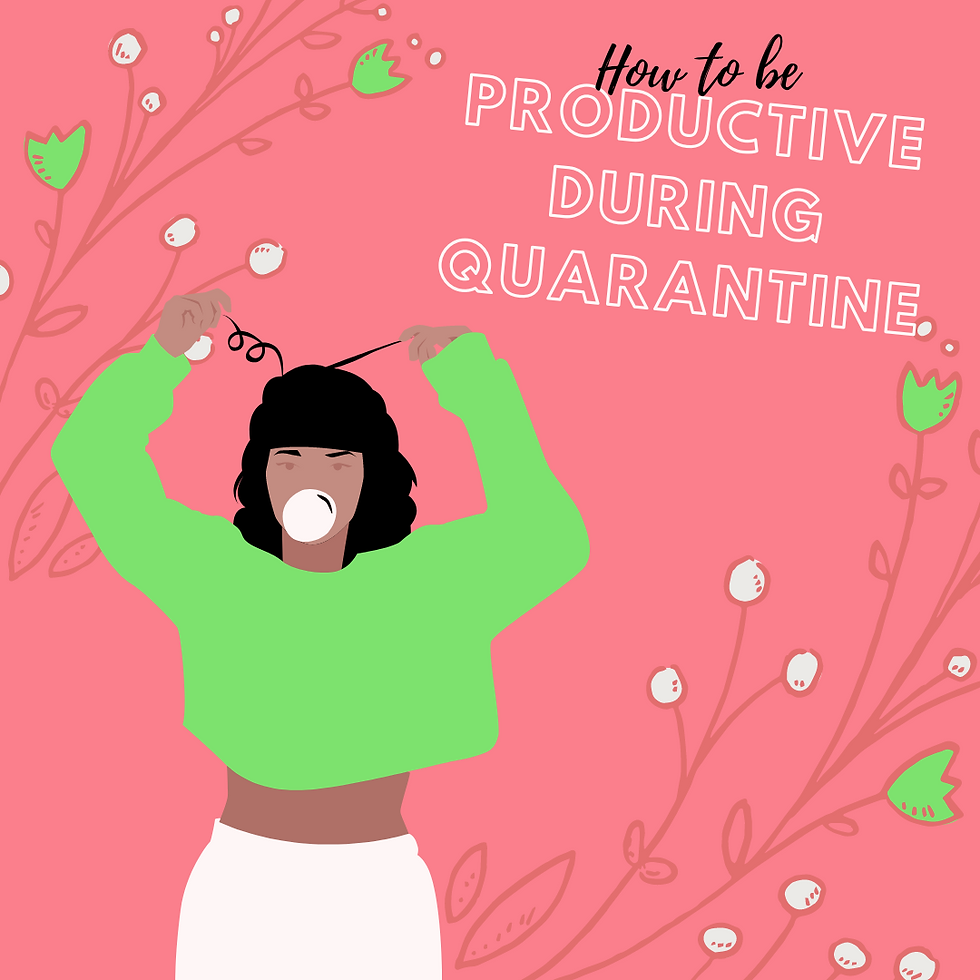How to Stay Productive During Quarantine
- Strawberry Opportunities

- Oct 31, 2020
- 4 min read
Written by Priyanka S.
Edited by Minna Chow & Kaylee Kim
Designed by Parniyan Haidari

This year has been completely unprecedented. The entire world came to a standstill, and humanity stopped in its tracks. Some countries have opened back up, some are still in lockdown, and the Covid-19 crisis is expected to last for a year more. It has been an especially hard time for students to cope with their studies. We’re all in a state of anxiety over the uncertainty of our futures. But life has to go on, and there’s always a silver lining. Here are some tips to make the most out of this quarantine and sustain, if not increase your productivity.
1. Prioritize your mental and physical health.
WFH [Work From Home] and SFH [Study From Home] may have become the newest acronym trends, but to actually do it is not as easy as it sounds. It can be excruciating to focus on studying when you are cooped up at home.
Here are some tips to help keep yourself healthy.
Accept that the situation is the way it is and that you have no control over it.
Find a self-care and workout routine that works for you.
Spend time with your parents and siblings, have fun with them.
Eat right and sleep well.
Keep yourself updated about the recent news, but don’t dump a lot of unnecessary information on yourself.
Give your phone a break.
For those stuck with abusive parents or toxic families, remember, this will end. Just hold on.
2. Have a flexible schedule
For all the night owls and insomniacs like me, quarantine is not magically gonna turn us into morning larks. It’s easier to make a schedule that’s reasonable and fits with your lifestyle than trying to become something you’re not. If you are used to studying at night, say from 12 AM to 4 AM, then keep doing it. Don’t try too hard to train your brain to break away from something it’s been doing since before the quarantine started.
3. Set up your ideal workspace/ study-table
These are some tips to help you set up your workspace.
Do not study or work from your bed or couch. If you wake up and then never get up from your bed, working/studying or surfing the internet, it’ll be hard for you to sleep at night.
Find a quiet place with good lighting and ventilation and set up your desk and chair there.
Make sure that you sit with a proper posture and that you are comfortable.
Minimize distractions around your study area: mute your phone, switch off the TV, and just focus on studying.
If you have no option but to study from your bed, do it on the opposite side of where you sleep.
4. Plan and prioritize.
Planning ahead is extremely important, especially in uncertain times like these. These are some tips to help you do that.
Be practical and try planning ahead about a week or so.
Break your study material into parts, and don’t try to cram it all into your head in a day.
Try to break down a huge topic into smaller, simpler subtopics and focus more on topics that are most important.
Set daily goals. Once you get an overview of the things you want to accomplish, it will be easier to concentrate.
Set aside time to revise your notes, but don’t be too hard on yourself when studying.
Take regular breaks.
5. Know what your day has in store for you.
If you go to sleep knowing what you have ahead of you tomorrow, you’ll be more likely to feel excited and prepared for it.
Familiarize yourself with the syllabus before the start of the class.
Break it into small chunks and focus on the heavier, harder topics first, as you might need to spend more time on them.
Keep your reference books and sticky notes nearby.
Track your assignments and deadlines.
Take note of things you’ve done during the day before you go to bed and plan the next day. This will make you feel good and energize you for the next day.
6. Expand your horizons.
You can use the time you have right now to learn a new skill, something which you’ve always wanted to do but never had the time to. Here are some suggestions:
It’s a great time to work on creating your resume—even if you don’t need one right now.
Try learning a new language, preferably one that will help increase your job prospects in the field you’re interested in.
You could work on your soft skills like problem-solving/communication.
Explore your creativity. Write poetry or stories/draw and doodle.
You can also help out by doing the laundry and dishes, and by cleaning your room and closet.
7. Follow a routine.
It might be hard to follow a routine during these uncertain times, but our brains love routine and you need to keep your brain happy if you want it to perform well. Each person is different, and you have to find a routine that works for you. Start with something small — meditating for 5 mins, keeping a journal, a light workout— and try doing it every day. Hold yourself accountable by asking a friend or a family member, or find a habit tracking app to make sure that you’re doing it without fail.
You finally have the long vacation you always wanted and this can be an incredibly productive vacation if you make smart decisions. Be safe and get some work done!






Comments